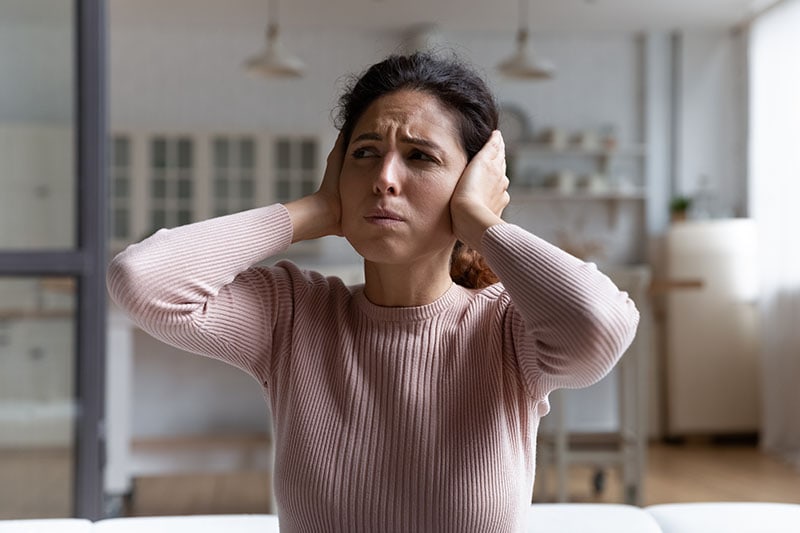Can Sound Waves Kill You? What The Science Tells Us
-
Chris Dinesen Rogers
- Last updated:

Many think loud noise is merely an annoyance that can cause a bad night’s sleep and make you irritable the next day. The people around you may have the same opinion. However, when we take this question one step further, the answer is yes, sound waves can kill you if they are intense enough. It can also cause short and long-term problems, which can affect your quality of life and lifespan.
The essential thing to remember is that your senses are critical for getting along in life. Sure, medicine has advanced and can help individuals cope. Your brain can also provide additional support due to neuroplasticity. It can compensate to some degree for an impaired sense. Let’s explore the impact of sound on hearing if you push the limits.
How Sound Is Measured
You must understand how sound is quantified to understand its effects. Scientists use two metrics, hertz (Hz) and decibels (dB). The former describes the frequency of the waves, while the latter considers their intensity. Another variable in terms of safety is the duration of the exposure. All three provide the necessary information to assess the risks.
The audible frequency range for humans is 20 to 20,000 Hz. Of course, some animals can hear above and below this spectrum. It’s worth mentioning that 20 Hz is the perception threshold. However, hearing is a two-way street. We must also consider dB. The detection of sound is 0 dB. Other measurements use it as a baseline.
A watch ticking is about 20 dB. Normal conversation bumps it up to 60 dB. You may also see this measurement written as dB(A), which considers it from a human perspective.
When Sound Crosses a Threshold

You can likely relate to how irritating sounds become when it gets to this level. The Centers for Disease Control and Prevention (CDC) classify sounds that exceed 85 dB as annoying. Exposure comes into play with these levels. For example, fewer sounds cross the line than a leaf blower. If you don’t wear ear protection, 2 hours of using one risks ear damage for the operator and those listening to the noise.
Keep that fact in mind when thinking about how it affects your children and pets. One of the most common unwanted behaviors in dogs is noise sensitivity.
Once you cross into three figures, you’re headed for trouble. If you listen to music at 105 dB or more at a nightclub or with a personal stereo system for over 5 minutes, you may experience hearing loss. Think of how it’s hard to hear anything the day after an especially loud concert. Of course, temporary effects are one thing. It can push the limits to the danger zone if the intensity climbs higher, however.
A dog barking in your ear at 110 dB for only 2 minutes can cause ear injury and its associated pain. If the intensity soars to 166 dB, you likely experience respiratory distress. It’s not a stretch to understand how dangerous sound can become. Death is imminent at 185 dB or more. You’re likely experiencing heightened adrenaline levels, vasoconstriction, and elevated blood pressure.
Infrasound Effects
We discussed the way sound is measured earlier. Let’s take that one step further by examining what the threshold can do to your body.
The lowest frequency humans can detect is about 20 Hz. Just because you can’t hear it doesn’t mean it doesn’t exist. That describes infrasound. You can still feel the pressure even if it isn’t audible. And it will still cause pain if it gets into the danger zone in decibels.
Vision issues are one of the first noticeable symptoms of harmful infrasound, followed by confusion. Pressure adversely affects many parts of the human body, causing these unpleasant effects. If the decibels increase with infrasound, it can lead to nausea and breathing difficulties.
All these things set the stage for a heart attack or myocardial infarction. Yes, sound waves can kill you in what would probably be a pretty painful way.

Final Thoughts
If you live in an urban area, you might not give a second thought to the noise all around you. Traffic and other sounds are merely a way of life. However, it’s essential to realize that long-term exposure can have detrimental health effects. It can cause anxiety in pets, learning disorders in children, and sleep issues in anyone exposed to noise.
The other takeaway is for individuals operating loud equipment. Our advice is to take care of yourself. Please wear ear protection whenever there are loud noises. The CDC reminds us that long-term exposure is also risky from everyday things like attending sporting events or movies, listening to music with headphones, or driving in traffic.
- https://www.ncbi.nlm.nih.gov/pmc/articles/PMC544930/
- https://www.ncbi.nlm.nih.gov/books/NBK10924/
- https://hearinghealthfoundation.org/decibel-levels
- https://noiseawareness.org/info-center/common-noise-levels/
- https://www.engineeringtoolbox.com/decibel-dba-levels-d_728.html
- https://www.cdc.gov/niosh/docs/98-126/pdfs/98-126.pdf?id=10.26616/NIOSHPUB98126
- https://noiseawareness.org/info-center/common-noise-levels/
- https://www.cdc.gov/nceh/hearing_loss/what_noises_cause_hearing_loss.html
- https://www.nature.com/articles/s41598-020-59837-z
- https://www.popsci.com/technology/article/2012-11/acoustic-weapons-book-excerpt/
- https://pubmed.ncbi.nlm.nih.gov/16934315/
Featured Image Credit: Jackie Niam, Shutterstock
Contents

